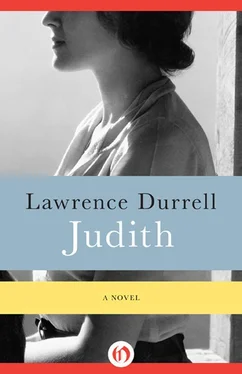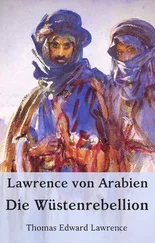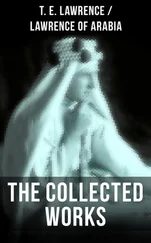The road began to curve and twist now, and on one of these curves they suddenly saw a figure detach itself from the shadow of an olive-tree and come racing down to the road waving its arms. It cleared the ditch at a bound and stood on the crown of the road with its arms outspread. A ripple of anxiety ran through them at the sight, and Anna for a moment increased speed as if she intended to run down the signalling figure, but all of a sudden she grunted and slammed on her brakes. “It’s Aaron,” she said, and her ugly face split into a smile. “So it is,” said the doctor. “What is he doing here?”
The figure facing them was that of a robust and broad-shouldered man in his late thirties, clad in nondescript clothes which faintly suggested British battledress. “What luck!” he cried, almost dancing with delight, “Anna darling!” And having stopped the lorry he leaped lightly onto the footboard and planted a kiss upon the ugly but radiant face of the driver. Then, thrusting his grinning face forward, he explained himself with breathless elation, his white teeth bared under the dark circumflex of a moustache which gave his face a faintly Kalmuk cast. “My bloody motor-bike broke down: I hoped you’d take this road. And you did. Bravo, Anna, bravo, Naomi! At least I shan’t have to spend the night walking to Haifa. Make room for me, will you?” He smiled at Judith and jerked his thumb with the easy assumption of authority. “You climb into the back with the others,” he said. Judith felt a sudden wave of annoyance at his tone and opened her mouth to say something, but before she could formulate either a question or a protest he had vanished again, uttering a brief “Wait.” While she climbed awkwardly over the back of the seat, surrendering her place and exchanging it for an uncomfortable crate among the other passengers, he had started to race back among the trees. He seemed to do everything at top speed. He stooped down to gather up a bundle and then ran down to the road once more, grinning with pleasure. The doctor moved into the centre to make room for him and he climbed aboard in high good humour, banging the door and crying, “All aboard!” The two women smiled indulgently at him as the lorry once more got into gear. He expelled his breath and mopped his head. Around his throat he wore a blue scarf and, dangling below it, a pair of binoculars; his useless motor-cyclist’s goggles he had drawn up on one leg so that he was wearing them on his calf.
“Well,” he said, and his tone suggested that of a good-natured autocrat of a small circle, “everything is marvellous; increasingly marvellous. The situation is getting so bad now that we can really afford to stop worrying. Another big trouble this afternoon at the Jaffa Gate with fifteen killed. Six British, my dears, and two Jews. All the rest Arabs. Tonight they are going to have a go at the Haifa factory.”
“I don’t see why you sound so elated,” said the doctor with a little shudder. “It’s horrible.” He looked suddenly chastened, like a scolded puppy, and nodded in agreement, his face grave again. “The horror is not of our making, alas!” he said in a different tone. They jogged on in silence for a while and now Anna turned the lorry northeast upon a road skirting mountain landscape — rude red rock burnished to the colour of dried blood in the sun. “I bet the road will be picketed,” said Anna gloomily. “It always is after trouble.” He seemed to cheer up. He put his arm affectionately around the doctor and said: “If we get through Nazareth without a block then there will be nothing to worry about. The only other person to stop us might be Lawton — Major Lawton — and we can talk him round. But what’s wrong anyway? Aren’t our papers in order? You girls have your cards?” He suddenly turned a narrow-eyed gaze upon the passengers in the truck, his lip curling. They all nodded. Judith gazed at him with mounting contempt. His manner infuriated her. Their eyes met coldly for a moment. “And you?” he said. “Why don’t you answer me?” Judith’s eyes ignited rebelliously, but she controlled her feelings. “I have my card,” she said. “Good,” said Aaron, turning back once more, the curtness of the word softened by a smile. “Then we have nothing to worry about. God, I’m hungry.” He groped about in his bundle for a piece of dry bread which he ate ravenously as he talked. Then he tilted a water bottle and drank. His lips were wet with red wine. He licked them carefully and wiped his moustache on the back of his hand. “Anyway,” he said, “Jerusalem likes my plans; we are going to get some more weapons if the bloody British don’t capture them.” He gave a short laugh. “And the valley of Ras Shamir will become a strong point. Good.” He rubbed his hands and then scratched his armpits. His buoyant, self-confident rudeness jarred on Judith. She found him one of the most disagreeable people she had ever met.
Nazareth, to their surprise, was quiet and they climbed the winding road into the mountains without incident. “There,” said Aaron when they were past the ugly straggle of streets and churches, “what did I say? We are in luck.” On they ran and the air turned colder; the sinking sun made the mountains glow like jewels. They passed a few mule-trains on the road, piloted by Druzes, but on the whole the countryside seemed deserted.
The rumble of their engine flapped and boomed back at them through the dark ravines as they turned the last shoulder of mountain and were able to stare directly down on the valley. Here Aaron stopped the lorry and got down to sweep the ranges with his binoculars. “Nothing unusual,” he cried cheerily and proceeded with sang froid to relieve himself against a tree before rejoining the lorry. As they let in the clutch and began to roll down the hairpin bend of the mountains, Judith sat up straight and gazed at the valley herself. At last, on the shoulder of a high pass, they saw the ugly mass of a concrete fortress pricking the skyline and Aaron remarked: “There is Major Lawton’s country house.” The doctor turned to Judith and said: “The border starts along there; and just beyond is our valley, only to the right, we have to crawl down the mountain again from this point until we reach bottom again. You’ll see it all from the next pass.”
In the gathering twilight (for the sun had just sunk behind the mountains of Lebanon) they rounded a steep bluff and came upon a platoon of infantry blocking the road. “What did I say?” growled Anna, delighted as all pessimists are when one of their prophecies proves true. The lorry drew to a halt before the battle-clad figures. And now a surprising thing happened, for Aaron turned in his seat and, with the calmest air of self-possession, slipped a revolver into the throat of Judith’s dress. It settled between her breasts, the steel icy cold. Before she could open her mouth, Aaron had opened the door and stepped down into the road. “Ah, Sergeant Manning,” he said. The sergeant peered at him and grinned. “I think you know us all,” said Aaron with a confident air. “We are getting back to Ras Shamir with some stuff for the farm.”
“Well, I’ll have to search you,” said the sergeant, and a couple of privates barked. “Everyone out. Papers please.” Laboriously they climbed down into the road, Judith, confused, almost on the point of tears, feeling the weight of the pistol sagging between her breasts. While a couple of privates searched the lorry, a third examined the identity cards with a perfunctory air; it was obviously a routine gesture. Yet two of the girls trembled so much that Judith wondered how they could avoid arousing suspicion. Meanwhile, Aaron chatted to the duty sergeant in familiar fashion, amiably putting up his arms and allowing himself to be frisked.
Читать дальше












